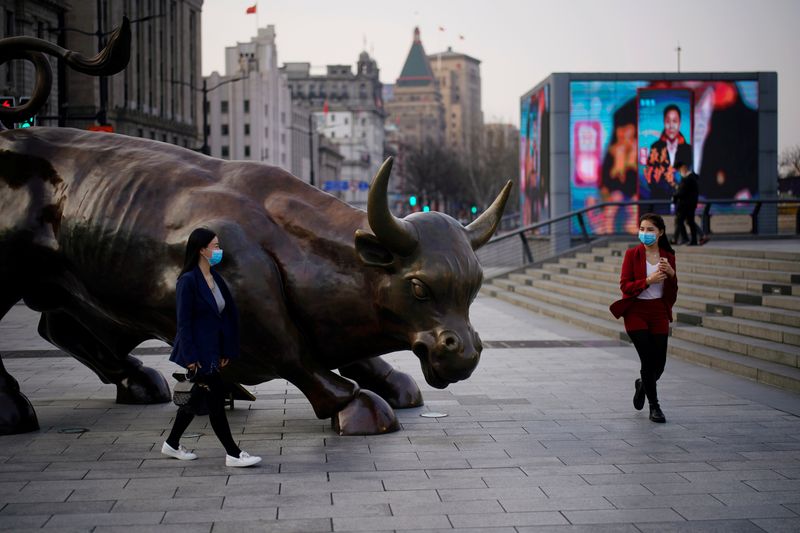By Hideyuki Sano
TOKYO (Reuters) - Asian shares tumbled on Friday after U.S. President Donald Trump ratcheted up already-heightened tensions with Beijing by banning U.S. transactions with China's tech giant Tencent (HK:0700) as well as ByteDance, the owner of video-sharing app TikTok.
MSCI's broadest index of Asia-Pacific shares outside Japan (MIAPJ0000PUS) lost 1% and Hong Kong's Hang Seng (HSI) fell 2%. Tencent, Asia's second-biggest company by market capitalisation, dropped 9.0%.
Mainland China's CSI 300 Index (CSI300) fell 1.3% while Japan's Nikkei (N225) slipped 0.6%. S&P500 futures (ESc1) slid 0.5%.
Trump's executive orders came as his administration said this week it was stepping up efforts to purge "untrusted" Chinese apps from U.S. digital networks. Tencent owns the popular WeChat app.
The announcement blew off any excitement from China's trade data, which showed exports surged 7.2% from a year earlier, way above economists' forecast of 0.2% fall.
The news also poured cold water on what had been a mildly positive mood in financial markets on hopes U.S. policymakers will finalise stimulus worth at least $1 trillion to support the country's fragile economy.
On Wall Street in the previous session, the S&P 500 (SPX) gained 0.64% and the Nasdaq Composite (IXIC) added 1%, marking the fourth straight day of record peaks.
Investors expect another U.S. stimulus package, though the White House and Democrats remained far apart about its size and what to include.
Risk appetite also got a mild boost after data showed on Thursday the number of Americans seeking jobless benefits for the first time fell last week to the lowest level since March.
Still, with a staggering 31.3 million people receiving unemployment checks in mid-July, there remain worries the labour market is stalling as the country battles a resurgence in new COVID-19 cases.
The next focus is a closely-watched employment data by the U.S. government, due at 1230 GMT, which is expected to show a payroll increase of 1.58 million in July, compared to 4.8 million in June.
U.S. bond yields have flirted with historic lows, supported by investors' conviction that the Federal Reserve will keep monetary policy loose for the foreseeable future and could strengthen its commitment to low rates as early as next month.
The 10-year U.S. Treasuries yield (US10YT=RR) fell to a five-month low of 0.504% and last stood at 0.535%.
Trend-following speculators appear to be buying both stock futures and bond futures, unusual behaviour as they normally tend to rotate from one asset to another, said Masanari Takada, cross-asset strategist at Nomura Securities.
"They seem to be aggressively buying both Treasuries futures and Nasdaq futures, probably with high leverage as market volatility, especially that of Treasuries, has been so low. But this suggests after they have bought everything, there is risk they will sell everything," he said.
The prospects of a prolonged period of easy U.S. monetary policy is supporting various asset prices while depressing the dollar.
Gold
The U.S. dollar, which has been in a clear downtrend since late July, edged back against risk-sensitive currencies after Trump's move.
The euro fell 0.3% to $1.1838 (EUR=) while the Australian dollar shed 0.35% to $0.7214
Still, many traders expect the dollar to weaken further.
"The U.S. has spent a massive amount of money for stimulus and the Fed has expanded balance sheet aggressively. So the dollar is abundant now," said Tatsuya Chiba, manager of forex at Mitsubishi Trust Bank.

Oil prices were little changed, with Brent futures (LCOc1) down 0.1% at $45.04 per barrel.